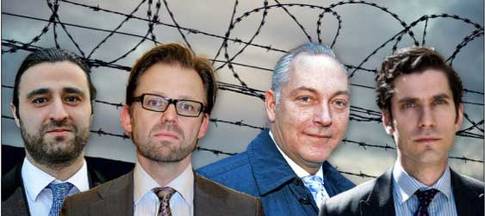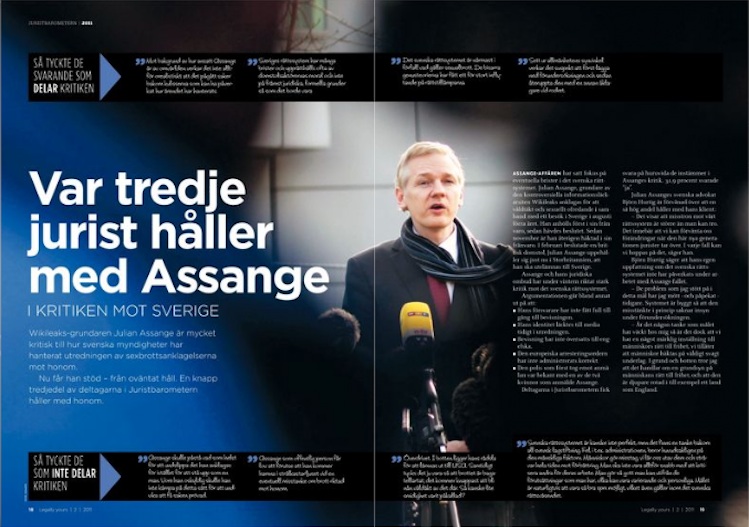Home » News
'The Swedish prison system: we call it torture'Top lawyers say the judges are avoiding the public debate about detention and 'restrictions'.
DUCKPOND (Rixstep) — It's been heard many times what plans Swedish prosecutor Marianne Ny has for Julian Assange should he ever set his foot in the country: he'll be held in isolation pending further 'investigation' and possible trial; he'll be also subjected to 'restrictions' which will further cut him off from the outside world.
This is above and beyond the tangible threat he be turned over to the US - a tradition in Sweden that's almost without exception.
Seven of Sweden's top lawyers - including former Assange counsel Björn Hurtig - have penned an op-ed for Aftonbladet, calling on the country's courts to immediately ameliorate a situation which has drawn significant criticism from international studies into torture.
'The Swedish prison system: we call it torture'

Sweden's had a few visits from international torture committees. And on each occasion, Sweden's use of 'restrictions' has been discussed and criticised. The reason is given. Use of restrictions is at a record high in Sweden in comparison to other countries. In Denmark, restrictions are only used in 3% of all cases; in Norway, only one person kept in detention in 2012 had restrictions; but in Sweden, 45% of all detainees are being held with restrictions!
'Restrictions' is a euphemism for 'isolation'. The suspect is placed in a 'hole', cannot have visitors, cannot use the telephone. The idea is to cut off the suspect's contacts with the world around. A number of research reports show that isolation leads to mental illness. Many prisoners demonstrate cognitive difficulties - everything from memory loss, difficulty with concentration and attention, and general cognitive sluggishness. This impairs their ability to defend themselves later in court.
And to add to the above: Sweden is one of the few countries with no legal limit on how long a person can be kept in isolation. An ongoing case has a person of 21 sitting in isolation - with full restrictions - for the past three years.
Sweden's prosector-general commissioned a study which resulted in a report submitted a few weeks ago. The idea with the study was to address the obvious issues. But the workgroup behind the study also came with alarming suggestions: they are suggesting that suspects be given sentence reductions if they confess whilst in isolation and that the system be modified to conduct full interrogations under the same conditions.
Those suggestions are extraordinarily alarming.
Our experience is that false confessions increase when people are held in isolation. The suspect foremost wants to escape the pressure of the situation; to offer discounts under those circumstances is very dangerous.

The idea of having thorough interrogations with suspects in isolation exposes a poor understanding of the principle of fair trial. The suspect will be subjected to interrogation by a judge without having been given any information about the investigation or even knowing what suspicions have been raised.
[Note: Neither Julian Assange nor his lawyers nor any other outsider had any idea why the Swedes were pursuing him until he arrived in a UK court; when the accusations were read out loud, the courtroom erupted in laughter. Ed.]
Criticism of the negative consequences of isolation are not really directed against the prosecution authority - they're directed against the Swedish courts. It's the courts that rule on detention and give the prosecutors permission to use restrictions.
A quick review of the authors and consultants on the report shows that judges are conspicuous in their absence. And we have yet to see a single magistrate take part in the public debate - this despite the entire detention issue being owned by the courts, all the while the rest of us can only have opinions in the matter.
Solving problems is a question of first admitting there is a problem, followed by a genuine ambition to remedy it. We see a problem with the current trends - with our extremely long detention times and the use of tortuous isolation. But our opinions don't matter as long as the judges are content with the status quo.
At the end of the day, it's a matter for legislators - for our parliament - to change the extremist rules Sweden has today as regards isolation of people who are not even convicted. But it's the responsibility of the courts to see that existing rules are applied in a humane way and in accordance with conventions to which Sweden is a part.
These things that happen every day in our prisons: we call them torture. Right now it's only the courts can stop them.
Johan Eriksson, Johan Åkermark, Jens Lapidus, Sargon De Basso, Peter Lindqvist, Björn Hurtig, Magnus Johansson
I can see the outside world
Everything's inviting in the outside world
- Garrett, Gifford, Hirst, Moginie, Rotsey
See Also
Assange Case: Björn's Letter to Jennifer
709 Swedish Jurists Agree with Assange
Assange Given Negative Special Treatment
|